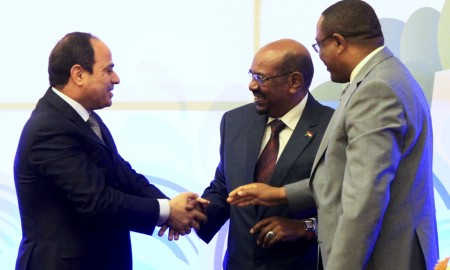Egypt, Sudan and Ethiopia have taken a step towards defusing tensions around Ethiopia’s construction of a massive dam on the Blue Nile, which has threatened to upset the geopolitical balance in the region over how to share water from the River Nile.

Egyptian President Abdel Fattah Al Sisi, Sudanese President Omar al-Bashir and Ethiopian Prime Minister Halemariam Desalegn signed a declaration in Sudan’s capital Khartoum on Monday (March 23), pledging to better share the Nile’s waters, an Egyptian presidency official familiar with the matter said.
Ethiopia has said the project is necessary to produce much-needed electricity, but the building of the dam has been controversial, with some scientists predicting it could disrupt the flow of the river into Egypt, where it provides much of the country’s water and also supplies electricity from the hydroelectric project at Aswan.
Monday’s move marks a change in Egypt’s attitude toward the multi-billion-dollar project.
In June 2013, the now-deposed Egyptian leader Mohammed Morsi came close to threatening war with Ethiopia over the project. “The lives of the Egyptians are connected around [the Nile]… If it diminishes by one drop then our blood is the alternative,” he said in a broadcast speech at the time.
But Mr. Sisi has struck a more conciliatory note with the Ethiopians, while Sudan, normally in line with Cairo’s policy over the Nile, has been acting as an intermediary.
Still, Mr. Sisi was careful not to sound too enthusiastic about Ethiopia’s plans, signalling that progress towards a final deal on how to share the Nile’s waters and the energy Ethiopia plans to produce hasn’t yet been struck.
“For the millions of Ethiopian citizens, Nahda [the Grand Ethiopian Renaissance] dam represents a source for development through producing clean and renewable energy, while for their brothers on the banks of the same Nile, in Egypt, who are almost as many in numbers, it represents a worrying premonition, for the Nile is their only source for water, for life,” the Egyptian president said in a speech delivered in Khartoum, according to a print version distributed to the press in Arabic.
He said Egypt was working with Ethiopia to achieve “mutual gains for everyone and avoid damage to any party.”
Ethiopia launched the works for the $4.2-billion project on the Blue Nile near its northern border with Sudan, four years ago this month.
Under a 1929 agreement signed by the U.K.—the former colonial power of Sudan and Egypt—the two countries get to use about 90% of the Nile’s waters. But the river’s tributaries, the White Nile that flows through Uganda and the Blue Nile that emanates in the Ethiopian highlands, are key to the survival of more than 100 million people in 11 countries on the African continent.
Ethiopia has boasted publicly of having raised the funding for the megaproject itself; however, Mwangi S. Kimenyi, a senior researcher at the Washington, D.C.-based Brookings Institution who has conducted research on the dam and the River Nile, said Western development organizations, normally first in line to fund such ambitious African infrastructure projects, shied away from the Renaissance dam for fear of irking Egypt.
“The Egyptians are coming to the realisation of the fact that the [colonial] agreement may not be sustainable,” Mr. Kimenyi said.
Ethiopian authorities have said the dam will be ready to produce electricity in 2017, and will be the largest hydroelectric project in Africa. Some 8,500 labourers are working around the clock to build it, they have said.
Since 1999, a number of African countries—including Uganda, Tanzania and Rwanda that are affected by the Nile but under the 1929 agreement have no stakes in it—have been lobbying for a revision of the way the Nile’s waters are shared.
Egypt has vehemently rejected any renegotiation of the colonial-era agreement, labelling the Nile and its waters a matter of national security. The Egyptian economy, agriculture in particular, depends heavily on the Nile, especially as its population is set to expand over the next decade.
A 2013 report by an international panel of experts, comprising two each from Egypt, Sudan and Ethiopia and four independent scientists, found there were indications the dam could negatively affect the water volumes of the Nile in Egypt, especially if there were consecutive dry years. But it said more research was needed to predict the long-term impact on Egypt and Sudan. There hasn’t been an in-depth scientific follow-up since.









